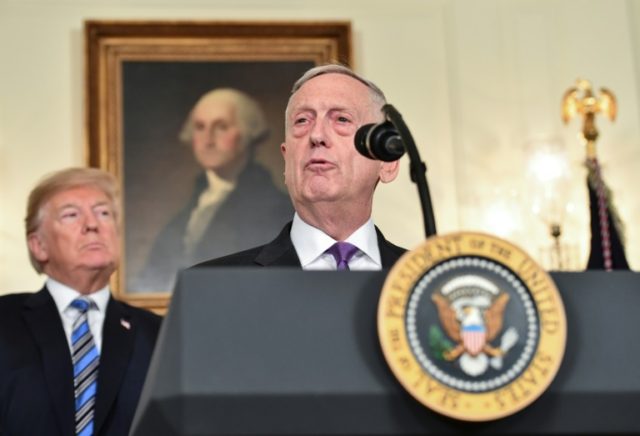U.S. Defense Secretary Jim Mattis asserted on Tuesday that the government of Turkey is correct to be concerned about Kurdish factions in Sinjar, Iraq, where they participated in eradicating the Islamic State (ISIS) to protect the majority-Yazidi population there.
Turkish President Recep Tayyip Erdogan has threatened to invade Sinjar and expel the Kurdistan Workers’ Party (PKK) from the area. The PKK is a Marxist U.S.-designated terrorist organization largely active in Turkey. In Iraq, they helped the Yazidis and the U.S.-allied Peshmerga fight the Islamic State, defeating them in 2015. They have vowed not to leave Sinjar until the Yazidis can defend themselves properly from further attack.
The PKK maintained an armed insurgency against the Turkish government in the nation’s south for decades, killing an estimated 40,000 people. In 1998, however, the head of the group, Abdullah Ocalan, denounced violence and called guerrillas who continued to be identified with him “murderers.”
On Tuesday, Mattis affirmed that the PKK remained a security issue for Turkey.
“There is a PKK threat in Sinjar, across the border in northern Iraq against Turkey,” he told reporters at the Pentagon, calling the PKK matter “a very sensitive issue for Turks.” According to the Turkish newspaper Hurriyet, Mattis also “said the U.S. stands with Ankara” and insisted that the United States has “open dialogue with the Turkish government right now.”
“The PKK, as you know, is a designated terrorist organization by the United States. They have killed innocent Turks,” he asserted.
Mattis has been largely supportive of Turkey’s anti-Kurdish measures this year. In January, Erdogan launched “Operation Olive Branch,” a military invasion of the northern Syrian province of Afrin, which constitutes part of Syrian Kurdistan (Rojava). At the time, Mattis stated that Turkey had “legitimate security concerns” regarding their target there, the Kurdish People’s Protection Units (YPG/YPJ). The YPG militia is allied with the United States, but also sympathetic to the PKK, and the Turkish government considers it indistinguishable from the Marxist group.
Mattis nonetheless argued that the Afrin attack “disrupts what was a relatively stable area of Syria. It distracts from international efforts to ensure the defeat of ISIS, and this could be exploited by ISIS and al-Qaida.”
In his remarks this week, he noted that the Turkish military had remained in Afrin and not moved on into Manbij, where the United States currently keeps a military presence. He attributed this to good communication between Washington and Ankara. Instead of Manbij, Erdogan has turned his eyes towards Sinjar. Erdogan has demanded that the Iraqi military expel the PKK from the northern region.
“Our hope is that Iraq will complete the operation there thoroughly,” Erdogan said in remarks this week. “If not, let’s hold our bilateral meetings and we will do what is necessary in Sinjar. We don’t have much tolerance for Sinjar.”
Sinjar was left in near complete ruin after the Islamic State occupation of 2014-2015. The terrorist group—which considers Yazidis particularly offensive infidels due to their worship of “Melek Taus,” a figure that jihadists consider akin to Lucifer—committed an act the United Nations designated as genocide against the Yazidis, killing as many of the men as possible and forcing the women into sex slavery. Many Yazidis died fleeing an Islamic State invasion by climbing up Mount Sinjar, which stands above the region, without food or water.
A year after the expulsion of ISIS, Sinjar remained largely devoid of critical infrastructure, without electricity or a functional water supply. “Sinjar’s infrastructure has been decimated, leveled to the ground,” a Yazidi activist told Breitbart News in 2016.
Hurriyet estimates that about 3,000 PKK fighters remain in Sinjar. Multiple reports claim that the PKK has already begun to pull out of the area. The Kurdish outlet Bas News reported on Wednesday that the PKK had begun moving out at the behest of the Iraqi regime. Sinjar District Governor Mahma Khalil asserted they would leave on Tuesday. The Iraqi military appeared to move troops into Sinjar on Tuesday, as well, to prevent the Islamic State from taking advantage of the PKK withdrawal. Tensions have reportedly already begun to brew between the Popular Mobilization Forces (PMF), a coalition of Iran-backed Shiite militias, and local Yazidis, Kurdish outlet Rudaw reported on Wednesday. A stalemate has reportedly formed over control of a shrine in the region.

COMMENTS
Please let us know if you're having issues with commenting.